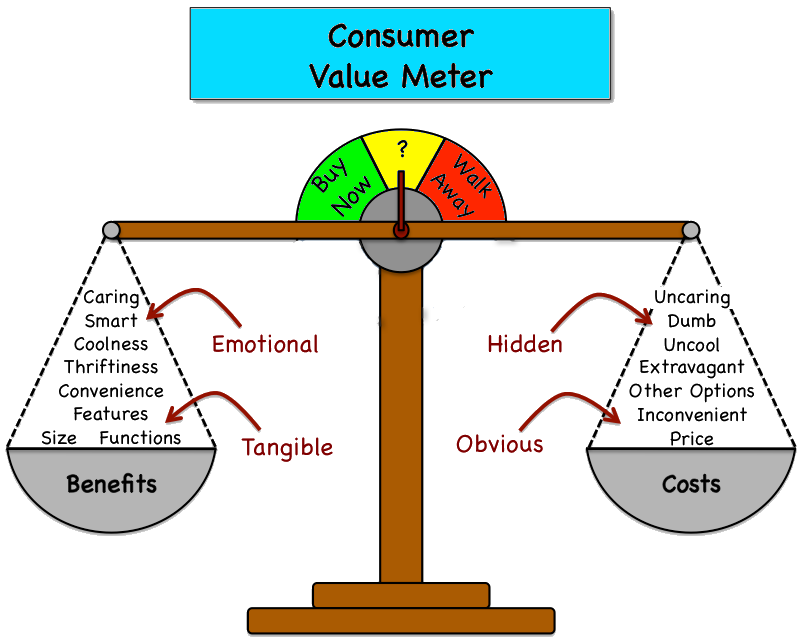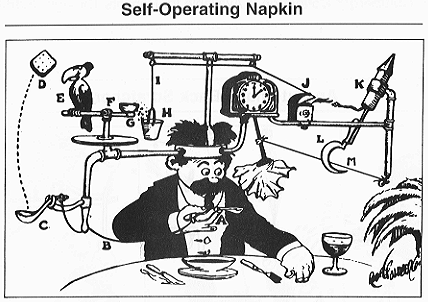There’s no question consumers are changing. Even though the recession has “officially” been over for more than two years, consumer confidence continues to decline, food prices continue to escalate beyond forecasts and gas prices are still $1/gal more than a year ago. As a result, economic pressures continue to cause tectonic shifts in consumer behavior. For businesses, recessions create market share fluidity (cf., Intel vs. Texas Instruments, Target vs. Kmart, Best Buy vs. Circuit City). But are private brands jumping on these new opportunities? Now’s the time. Here’s how: Reset, Rebalance & Redesign…
Reset – Core Value Propositions
All consumers have a built-in value meter when it comes to buying anything. It weighs a combination of tangible, functional benefits and a whole pile of emotional ones against all the negatives. In fact, studies in neuroscience have shown that buying decisions are emotion-driven. So, given the long-term impact of the recession on consumer behavior, the first order of business is to reset core value propositions (the bundle of tangible and intangible benefits you promise to provide me if I buy your product) to speak to new consumer mindsets and emotions. And keep in mind this is more than just resizing packages.
It weighs a combination of tangible, functional benefits and a whole pile of emotional ones against all the negatives. In fact, studies in neuroscience have shown that buying decisions are emotion-driven. So, given the long-term impact of the recession on consumer behavior, the first order of business is to reset core value propositions (the bundle of tangible and intangible benefits you promise to provide me if I buy your product) to speak to new consumer mindsets and emotions. And keep in mind this is more than just resizing packages.
Rebalance – Marketing Dollars Along the Path to Purchase
If you’re waiting to impress consumers when they get to the store shelf, the first  moment of truth, you’re too late. Back in 2007, 60% of consumers made purchase decisions before entering the store. By 2009, that number had jumped to over 80% (the opposite of conventional wisdom which said 70% of decisions were made in store). As a result, companies like Campbell Soup are rebalancing marketing dollars farther upstream along the path to purchase. Additionally, CPGs are utilizing a broad mix of marketing tactics and doing what they can to conquer marketing’s troublesome triad: emerging technologies, emotional appeal, and flawless execution.
moment of truth, you’re too late. Back in 2007, 60% of consumers made purchase decisions before entering the store. By 2009, that number had jumped to over 80% (the opposite of conventional wisdom which said 70% of decisions were made in store). As a result, companies like Campbell Soup are rebalancing marketing dollars farther upstream along the path to purchase. Additionally, CPGs are utilizing a broad mix of marketing tactics and doing what they can to conquer marketing’s troublesome triad: emerging technologies, emotional appeal, and flawless execution.
Redesign – For Speed and Efficiency
Many businesses over time become a tangled web (a hairball) of processes and work that’s not adding value; sort of a Rube Goldberg approach to business. Unnecessary or low value process inevitably slows down getting ideas to market. That’s one reason execs cite time to market as a major innovation risk. They need to cut out non-value added work, automate back room administrative tasks (specs, routing, formulations, etc.) and focus resources on real value creation. Simplification and business redesign with a focus on speed can result in bigger (more revenue), better (more incrementality) and faster ideas to market.
Unnecessary or low value process inevitably slows down getting ideas to market. That’s one reason execs cite time to market as a major innovation risk. They need to cut out non-value added work, automate back room administrative tasks (specs, routing, formulations, etc.) and focus resources on real value creation. Simplification and business redesign with a focus on speed can result in bigger (more revenue), better (more incrementality) and faster ideas to market.
There’s no question consumer behavior has changed as a result of the economy. And many brands, private brands included, have felt the impact. But will private brands see the opportunities in the current economic climate? Will they reset, rebalance and redesign to take advantage of the opportunities? Time will tell.
I’m looking forward to checking out the current thinking and innovation at this year’s Private Brand Movement September 19-21 in Chicago sponsored by IIR USA. I’ll let you know what I find out.